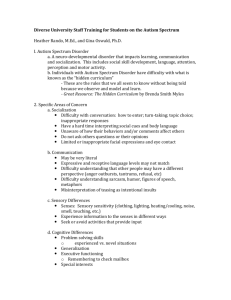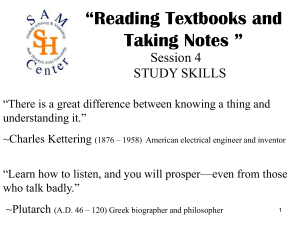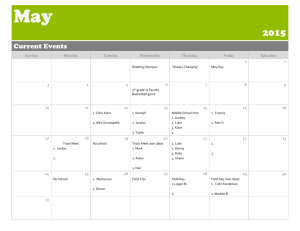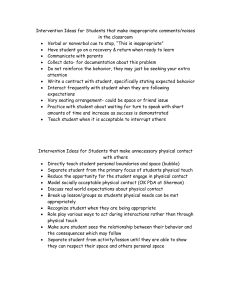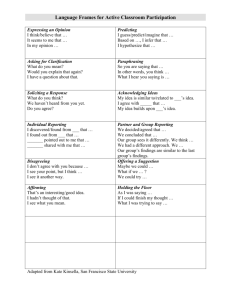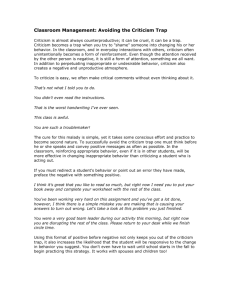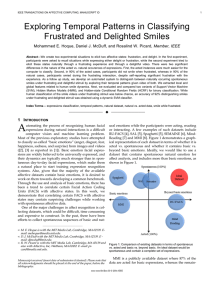Things Colin wants you to know about him
advertisement
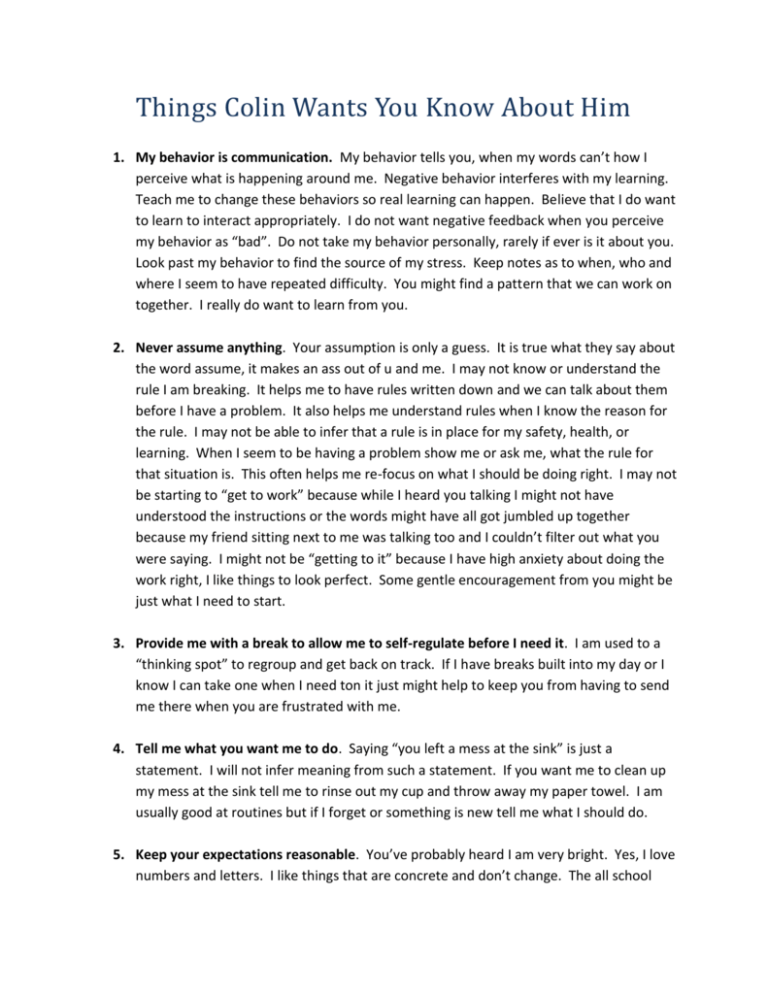
Things Colin Wants You Know About Him 1. My behavior is communication. My behavior tells you, when my words can’t how I perceive what is happening around me. Negative behavior interferes with my learning. Teach me to change these behaviors so real learning can happen. Believe that I do want to learn to interact appropriately. I do not want negative feedback when you perceive my behavior as “bad”. Do not take my behavior personally, rarely if ever is it about you. Look past my behavior to find the source of my stress. Keep notes as to when, who and where I seem to have repeated difficulty. You might find a pattern that we can work on together. I really do want to learn from you. 2. Never assume anything. Your assumption is only a guess. It is true what they say about the word assume, it makes an ass out of u and me. I may not know or understand the rule I am breaking. It helps me to have rules written down and we can talk about them before I have a problem. It also helps me understand rules when I know the reason for the rule. I may not be able to infer that a rule is in place for my safety, health, or learning. When I seem to be having a problem show me or ask me, what the rule for that situation is. This often helps me re-focus on what I should be doing right. I may not be starting to “get to work” because while I heard you talking I might not have understood the instructions or the words might have all got jumbled up together because my friend sitting next to me was talking too and I couldn’t filter out what you were saying. I might not be “getting to it” because I have high anxiety about doing the work right, I like things to look perfect. Some gentle encouragement from you might be just what I need to start. 3. Provide me with a break to allow me to self-regulate before I need it. I am used to a “thinking spot” to regroup and get back on track. If I have breaks built into my day or I know I can take one when I need ton it just might help to keep you from having to send me there when you are frustrated with me. 4. Tell me what you want me to do. Saying “you left a mess at the sink” is just a statement. I will not infer meaning from such a statement. If you want me to clean up my mess at the sink tell me to rinse out my cup and throw away my paper towel. I am usually good at routines but if I forget or something is new tell me what I should do. 5. Keep your expectations reasonable. You’ve probably heard I am very bright. Yes, I love numbers and letters. I like things that are concrete and don’t change. The all school assembly with the guy talking about pizza is meaningless to me. I will be more fascinated with the words written around the gym then what is actually going on. I can sit through an assembly if you prepare me for what I am going to see and hear. If you doubt that I will sit quietly let me take a book or give me a different job during that time. Give me a choice to go, sit and listen or do something that is an acceptable alternative to you. This could keep both you and me from having a meltdown. 6. Don’t make a bad situation worse. I really don’t plan or mean to show frustration in an inappropriate manner or otherwise disrupt your classroom. I want to be at school and I want to learn. You can help me by not responding in anger or sarcasm. These responses from you will prolong or escalate my behavior. a. Raising the pitch or volume of your voice. I hear yelling and shrieking but not you words. Lowering your voice and keeping it even and unemotional helps me to listen and hear what you are saying. I will pick up on your emotions and will react negatively to negative emotions. b. Mocking or mimicking me. I cannot be embarrassed out of a behavior. c. Invoking a double standard. Just because I have pushed you to frustration does not give you the right to treat me more harshly than you would my peers. d. Bringing up a previous or unrelated event. I don’t harbor grudges nor do I “hang on to incidences. When something is over it is done for me. If you bring it up it will only doubly confuse me in a time of crisis. e. Lumping me into a general category. I am not “those kids”. I am as unique an individual as you. I have lots to learn from you and you in turn learn lots from me. 7. Criticize gently. How well do you take “constructive criticism”? The maturity and selfconfidence to be able to interpret your criticism are beyond me right now. Should you correct me if my behavior warrants it? Of course. I need you to teach me to understand what inappropriate behaviors are in a supportive, problem solving way. I will react to your tone of voice more than your words. Speak to me in low tones and lower yourself to my level. You are an imposing figure standing there hovering over me. I am just learning about emotions. I like to be happy but when my behavior demonstrates to you that I am not probe beyond my behavior. I might need you to give me the words to express myself. Even though I know big words and can talk, when I am sad, angry, frustrated, jealous or afraid my words my fail me and all that is left is inappropriate behavior. Positive practice and support will help me learn more quickly how to respond than criticism. 8. Offer real choices and only real choices. Adults often get angry with me when I choose not to do something. If you ask me “can you pick that up?” to me that is optional and I can choose not to do it. Asking me “Do you want….?” sounds like a yes or no question to me. If it is not an option tell me what I should be doing. “Colin pick up that paper on the floor and throw it away”. Giving me choices helps me learn appropriate behavior, but you have to help me learn that I won’t always have a choice. When there isn’t a choice, I won’t get frustrated if I know why. “Sometimes you have a choice, but right now it is my choice. 9. I want friends. Just because I have a different style of learning and expressing myself does not mean I want to be isolated or alone. I don’t have mature conversational skills and often I don’t even quite know how to start talking to someone. I have great solitary play skills. I need you to help me “get involved”. Just because I don’t initiate don’t interpret that as not wanting to participate. One last thought BELIEVE! Whether you think you can or whether you think you can’t you are usually right. Henry Ford Believe you can make a difference for me. It will require the two of us working together. I am a child with Autism. But I am a child first. There is no upper limit to what I can accomplish with people believing in me. I can sense far more than I can communicate and I can sense whether or not you think “I can do it”. I think you can teach me and I am asking you to believe that you can.. Expect more and you will get more. Encourage me and the legacy of learning you will have inspired in me well last long after I have left your classroom. Adapted for Colin from Ellen Notholohom’s “Ten Things Every Child with Autism Wishes You Knew”
